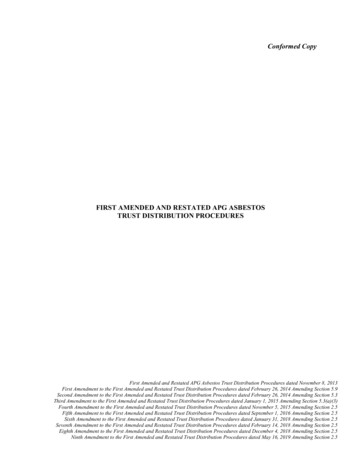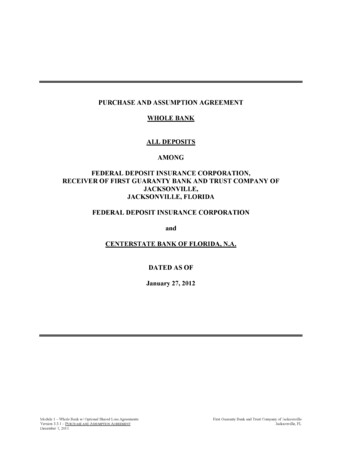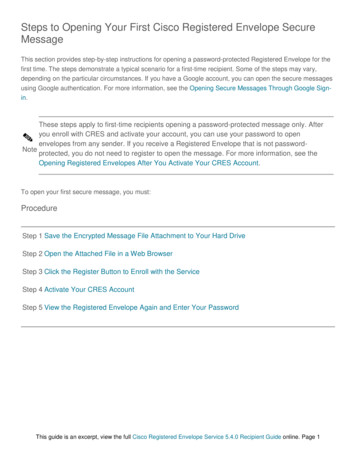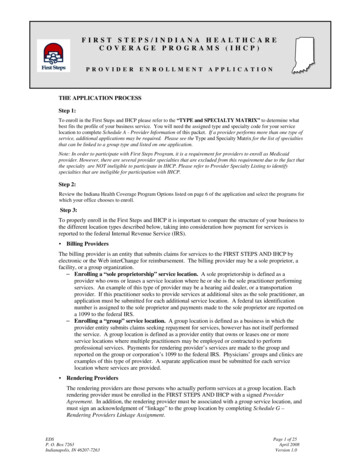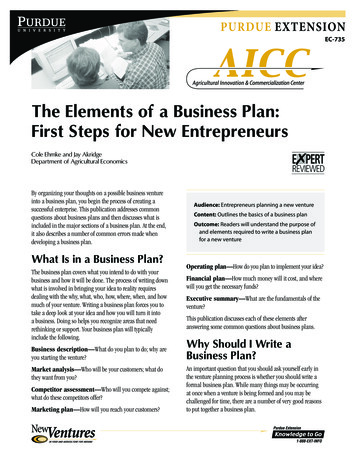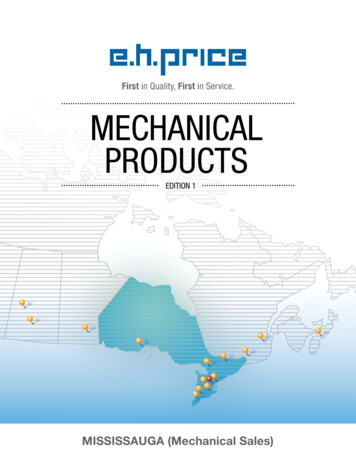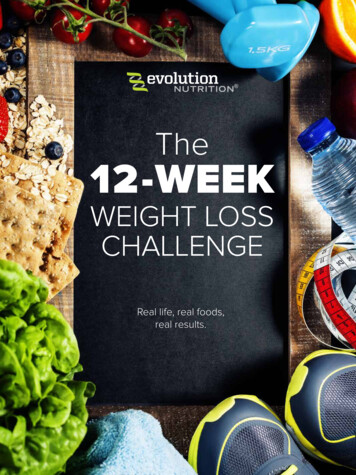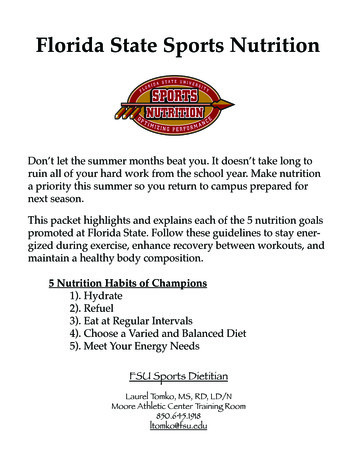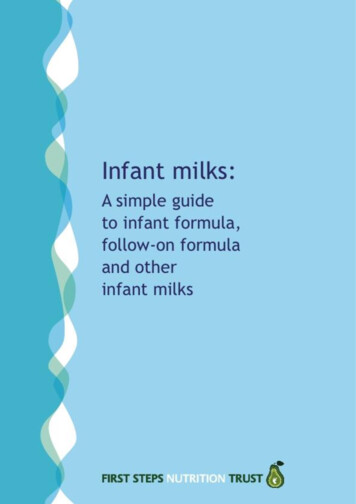
Transcription
First Steps Nutrition Trust: A simple guide to Infant Milks. December 2017: page 1
Infant milks: A simple guide to infantformula, follow-on formula and other infantmilksPublished by First Steps Nutrition Trust,December 2017A PDF of this resource is available on the FirstSteps Nutrition Trust websitewww.firststepsnutrition.orgThis resource is provided for information onlyand individual advice on infant feeding shouldalways be sought from appropriate healthprofessionals. The information in thisresource is updated regularly so check thatyou are using the latest version available.First Steps Nutrition Trust112 Queens RoadLondon SW19 8LSE: helen@firststepsnutrition.orgRegistered charity number: 1146408First Steps Nutrition Trust is a charity whichprovides clear, evidence-based andindependent information and support for goodnutrition from pre-conception to five years ofage. For more information, see our This resource was written by Dr HelenCrawley.Edited by Wordworks.Design by Sally Geeve.This simple guide to infant formula,follow-on formula and other infantmilks provides information aboutthese breastmilk substitutes toensure simple, clear, evidencebased information is available to all.First Steps Nutrition Trust fullysupports public healthrecommendations that mothersshould exclusively breastfeed forthe first six months whereverpossible, and continue tobreastfeed alongsidecomplementary foods in the secondsix months of life and for as longafter that as the mother wishes todo so.ContentsWhat is in this guide?Types of infant milksA simple guide to choosing milksfor infants and toddlersFrequently asked questionsHow to bottle-feedHow much milk do babies need, andhow often should I offer milk feeds?Making up powdered milks safelyFor more information123415171820First Steps Nutrition Trust: A simple guide to Infant Milks. December 2017: page 2
What is in this guide?This guide provides simple advice on the infant milks to choose in the first two yearsof life if parents are not breastfeeding. The reasons for these recommendations aresummarised in the frequently asked questions on page 4. The guide also providesinformation on the amount of milk that current recommendations suggest an infantand young child needs, and on how to make up powdered formula milk safely.If you want support or further information about infant milks, talk to yourmidwife or health visitor. If you have any concerns about your baby’s health,talk to your GP or another health professional.First Steps Nutrition Trust: A simple guide to Infant Milks. December 2017: page 3
Types of infant milksIn the UK there are a variety of infant milks for sale. These are marketed as: infant formula – milks which are the sole food for infants from birthfollow-on formula – milks only to be used after 6 months of agemilks which are called foods for special medical purposes, andmilks for children over the age of 1 year.There are clear regulations that govern the composition, safety and marketing ofinfant formula and follow-on formula in all areas of the UK. There are differentregulations for some of the specialist formula (which should in theory only beavailable under medical supervision). There are currently no regulations for milksmarketed for children over 1 year of age.A safe, nutritionally adequate infant formula is needed where parents cannot, orchoose not to, breastfeed their infants. However, there is little evidence for many ofthe claims made for ingredients used in milks marketed for infants and youngchildren. It is therefore important that everyone has access to independent, simpleand evidence-based information about which milks to choose in thefirst years of life.First, we give a simple guide to which infant milks are suitableat what age. Then, in the Frequently asked questions sectionon page 6, we give some explanations about this guidance.All of the evidence for the information given is explained andreferenced in the comprehensive guide Infant milks in the UK: Apractical guide for health professionals, which you candownload from www.firststepsnutritiontrust.orgYou may see lots of adverts and information on company websites about differentmilks, why they are useful and claims about special properties. Remember that infantmilk manufacturers use their marketing budgets to provide information on infantfeeding to parents and health professionals, and that the information on theirwebsites can be misleading, biased and may not reflect current health policy in theUK. Sources of independent information for the UK can be found at the back of thisresource.First Steps Nutrition Trust: A simple guide to Infant Milks. December 2017: page 4
A simple guide to choosing milksfor infants and toddlers Safe to give.this milk.X Do not giveInfants0-6 monthsInfants6 months –1 yearToddlers1 year –2 yearsBreast milk Whole cows’ milk (or goats’ milk, sheep’smilk or unsweetened calcium fortifiedsoya milk or milk alternative) as main milkdrinkXX Infant formula suitable from birth(cows’ or goats’ milk based) Only needed ifrecommendedby a healthprofessionalInfant formula marketed for hungrierbabies, suitable from birth (cows’ milkbased)NotNotrecommended recommendedNot neededFoods for special medical purposesavailable over the counter: anti-reflux,lactose-free, partially hydrolysed, andcomfort milksOnly useunder medicalsupervisionOnly useunder medicalsupervisionOnly use undermedicalsupervisionSoya protein based infant formulasuitable from birthOnly useunder medicalsupervisionOnly useunder medicalsupervisionNot neededFollow-on formula suitable from 6 monthsof age (cows’ or goats’ milk based)XNotrecommendedNot neededGoodnight milkXNotrecommendedNot neededGrowing-up milks and toddler milkssuitable from around 1 year of age(cows’ milk, goats’ milk or soya milkbased)XXNot neededPaediaSure Shake for fussy eatersXXXRice milk – Do not give to children under5 years of age.XXXFirst Steps Nutrition Trust: A simple guide to Infant Milks. December 2017: page 5
Frequently asked questions Where can parents get advice to help them continue breastfeeding ifthey are having difficulties, or are thinking about introducing formulamilk? Is there a formula milk that is closest to breastmilk? Is there any evidence that a hungry baby formula will help babies tosleep better? Is formula based on goats’ milk less allergenic than formula made fromcows’ milk? If a baby is bringing up milk after feeds, do they need a special formulato prevent reflux? My baby is unsettled in the evenings and cries a lot. Will a comfort milkhelp settle her stomach? My baby has diarrhoea and I think he may be in pain after feeds. Couldhe need a lactose-free formula? I am worried my baby might be allergic to cows’ milk protein. Is there amilk I can buy which is suitable for babies with this allergy? Is soya-based formula a good option if there are allergies in the family? We are vegetarians. Which milk should we use if we want a vegetarianformula for our baby? We are vegans. Is there a suitable infant formula if we want to bring ourbaby up as a vegan? Are infant formula halal? Are ready-to-feed milks different to powdered milks? Can a partially hydrolysed formula prevent eczema in infants? Do babies need follow-on formula after 6 months of age? At what age can I use cows’ milk as the main drink? What non-dairy alternatives to cows’ milk are suitable from 1 year ofage? How do toddler milks and growing-up milks differ from whole animalmilk? Is an infant milk for ‘fussy eaters’ useful? Is home-made infant formula safe to use?First Steps Nutrition Trust: A simple guide to Infant Milks. December 2017: page 6
Q. Where can parents get advice to help them continue breastfeeding if theyare having difficulties, or are thinking about introducing formula milk?A. There are a number of national helplines and organisations that can offer supportto women who are breastfeeding. Many women regret giving up breastfeeding andreally value the opportunity to get support to continue. Most health professionals andlactation consultants agree that, once formula milk is introduced, breastfeedingcontinuation is compromised. Every drop of breastmilk counts, however, so seekhelp to continue breastfeeding even if you plan to introduce formula as you can stillgive your baby some breastmilk. Never be afraid to ask for help at any stage of yourbreastfeeding journey. All the helpline volunteers know what you are going through .Breastfeeding helplinesNational Breastfeeding Helpline0300 100 0212La Leche League Helpline0845 120 2918The National Breastfeeding Helpline isstaffed by volunteers from theBreastfeeding Network and TheAssociation of Breastfeeding Mothers.Calls can be answered in English, Welshand Polish.NCT Helpline0300 330 0771Q. Is there a formula milk that is closest to breastmilk?A. No. It is impossible to recreate breastmilk. Breastmilk is not only nutritionallyuniquely suited to the human infant; it also contains hundreds of unique componentsand living cells to protect infants from infection and to aid development. Thesecomponents cannot be made in a laboratory. All formula milks have to be of a similarcomposition to comply with EU compositional requirements and they are allnutritionally adequate for infants. If a substance was found that was definitelybeneficial for infant health that could be added to formula milks, it would be in allformula by law.Q. Is there any evidence that a hungry baby formula will help babies to sleepbetter?A. No. There is no evidence that milks marketed for hungry babies offer anyadvantage, and it is recommended that first milks are used throughout the first yearof life if babies are not being breastfed. Hungry baby milks have more ‘casein’ than‘whey’ in the protein mix, and casein is harder for babies to digest. An infant has aFirst Steps Nutrition Trust: A simple guide to Infant Milks. December 2017: page 7
tiny tummy and needs to eat little and often, day and night, in the first few weeks andmonths. First infant milk (whey-based) will provide the best alternative if babies arenot being breastfed (or are not receiving milk from a milk bank). Whey-based infantformula is the only breastmilk substitute needed throughout the first year of life.Q. Is formula based on goats’ milk less allergenic than formula made fromcows’ milk?A. No. Milk based infant formula can have cows’ milk or goats’ milk protein as themain protein source. They are equivalent in terms of allergenicity and safety.Q. If a baby is bringing up milk after feeds, do they need a special formula toprevent reflux?A. Many babies will bring up small amounts of milk after feeds or if they burp, andthis causes them no distress. Crying, vomiting milk after feeds, and back-arching orbeing unsettled are not symptoms of reflux in most babies. Reflux is rare and shouldbe properly diagnosed by a paediatrician. If your baby brings up milk after feeds, itmay be that he needs smaller milk feeds more often, or may need more frequentwinding during a feed. As long as your baby is growing adequately, many of theseproblems will disappear as he gets bigger. You can talk to your health visitor or GPfor reassurance if you are worried. Thickened (anti-reflux) milks do not have tocomply with infant formula regulations in the UK, and they should only be used undermedical supervision. There are several reasons to be cautious about using thesemilks: These formula contain cereal-based thickeners, and infants do not needanything other than milk in the first few months of life. Manufacturers recommend that anti-reflux formula are made up at lowertemperatures than the temperature currently recommended for safety, and it isimportant that this potential risk is considered by a medical practitioner.Powdered formula are not sterile, and making them up at lower temperatures willnot kill any harmful bacteria that might be present. If your baby is taking certain medicines, it may not be advisable to give them ananti-reflux formula.In 2015 NICE published guidelines to support health professionals, including GPsand hospital doctors, that will help everyone provide consistent, evidence-basedsupport for anyone concerned about infant reflux and regurgitation. You can read theguidance t Steps Nutrition Trust: A simple guide to Infant Milks. December 2017: page 8
51035086789. This guidance has also been reiterated in NICE Quality Standardspublished in 2016 available at www.nice.org.uk/guidance/qs112Q. My baby is unsettled in the evenings and cries a lot. Will a comfort milk helpsettle her stomach?A. It is not uncommon for young babies to be unsettled or fussy in the evenings andto cry more than they might at other times of the day. You may be surprised to knowthat the average amount a baby cries in the first six weeks of life is about 110minutes a day, reducing to about 75 minutes a day at 10-12 weeks. All babies aredifferent and many need more attention and soothing in the evenings, frequent smallfeeds and frequent winding (during and after feeds) in the first few months. There isno consistent evidence that comfort milks improve babies’ wind, colic, constipation orfussiness, and these will pass as the baby gets older. Often small changes to thetiming and quantity of feeds can be effective in managing periods of fussiness.Q. My baby has diarrhoea and I think he may be in pain after feeds. Could heneed a lactose-free formula?A. Lactose intolerance is rare in babies and it is important not to self-diagnoselactose intolerance in case your baby has a cows’ milk protein allergy, which isserious and needs to be treated very differently. Cows’ milk protein allergy is alsouncommon but, if your baby has sickness or diarrhoea and has signs of animmediate allergic reaction after a milk feed (a red itchy rash around his mouth,facial swelling, red lumps on the body, or a streaming nose), or symptoms of adelayed reaction such as eczema or poor growth, it is important to seek help as soonas you can for a proper diagnosis. If a baby ever has breathing problems or goesfloppy after a feed, call an ambulance. Thankfully this is very rare. Diarrhoea may bea symptom of a gastro-intestinal infection rather than an intolerance, and somebabies might have a temporary lactose intolerance after a bout of gastrointestinalillness. If you think this might be the case, you should talk to your GP or healthvisitor. It is important to use lactose-free milks under medical supervision, as thesource of carbohydrate in these milks is more likely to damage teeth and the risks ofusing any specialist milk products should always be weighed up against anypotential benefit.Q. I am worried my baby might be allergic to cows’ milk protein. Is there a milkI can buy which is suitable for babies with this allergy?A. If you have allergies in your family, there is lots of evidence that breastfeeding isthe best way to protect your baby from developing allergies. Some infant formulamay claim to reduce the risk of a baby developing an allergy, but experts in the UKFirst Steps Nutrition Trust: A simple guide to Infant Milks. December 2017: page 9
do not believe there is good enough evidence to make this claim. Cows’ milk proteinallergy is uncommon (it is thought that between 6% and 8% of children aged 0-3years in the UK have food allergies). Cows’ milk protein allergy can only bediagnosed and managed by your GP or a paediatrician, and they will follow specificclinical guidelines to do this. If you are breastfeeding, you can carry on doing so ifyou make some changes to your own diet. If a baby is on formula milk already, anextensively hydrolysed or elemental formula is suitable for managing cows’ milkprotein allergy, and these are only available on prescription. Don’t try and selfdiagnose your baby. Talk to your GP about your concerns, and avoid websites whichmay offer confusing information or suggest tests which are not recognised as helpful.You can see the NICE guidance about what to do if cows’ milk protein allergy issuspected, at n-children#!scenarioFor NICE guidance about what to do if cows’ milk protein allergy is diagnosed, gy-in-children#!scenario:1Q. Is soya-based formula a good option if there are allergies in the family?A. No. Soya-based formula is not recommended for use in infants under 6 months ofage unless recommended by a medical practitioner. These milks are notrecommended for use without medical supervision for a number of reasons: Children are as likely to be allergic to soya as to cows’ milk protein, and thisneeds to be investigated. Soya is a rich source of phyto-oestrogens and these mimic sex hormones in thebody. For older children and adults, some soya is not a problem, but for babiesunder 6 months who have soya protein based formula as their sole source ofnutrition, current guidance in the UK is that the phyto-oestrogens in soya-basedformula should be carefully considered as a risk.The carbohydrate source of soya protein based formula is glucose, which is morelikely to damage teeth.If infants are allergic to cows’ milk, they will be prescribed a suitable formula by theirGP, and it is recommended that parents and carers should not use soya formulawithout taking professional medical advice.Q. We are vegetarians. Which milk should we use if we want a vegetarianformula for our baby?A. Many of those who choose a vegetarian diet will breastfeed their babies and willnot require an infant milk in the first year of life. Currently the only first animal milkbased infant milk powders on the market suitable for vegetarians are Similac FirstFirst Steps Nutrition Trust: A simple guide to Infant Milks. December 2017: page 10
Infant Milk, Kendamil First Infant Milk, Kendamil Mehadrin First Infant Milk and Holleorganic goats’ milk formula 1. Other milks either contain fish oils and/or use theanimal-derived enzyme rennet during the lactose production process. Rennet is usedto separate curds from whey and, although vegetarian alternatives are available,they are not used by all manufacturers. Although soya protein based infant formulaare vegetarian and are advertised as suitable for vegetarians by manufacturers,these are not recommended for use in the first 6 months of life without medicalsupervision.Q. We are vegans. Is there a suitable infant formula if we want to bring ourbaby up as a vegan?A. Currently there are no infant milks suitable for vegans on the UK market, sinceeven those that do not contain a source of animal protein do all contain vitamin Dsourced from sheep’s wool. Those who choose a vegan diet for themselves and whobreastfeed throughout the first year can move their child onto a non-animal milk atone year of age. It is recommended that parents who want to bring up their baby as avegan seek expert advice to make sure that all their baby’s nutritional needs are met.Guidance on how to ensure a breastfed baby with a vegan mum gets all the nutrientshe or she needs, can also be found in the resource Eating well: vegan infants andunder-5s, which can be downloaded fromwww.firststepsnutrition.org/pdfs/Eating well for veg infants for web.pdfQ. Are infant formula halal?A. Some, but not all infant milks, are halal approved, and it is important to check thelabel. Status may also vary by type of milk within the same brand. The powderedinfant milks may be halal approved but the ready to feed versions of the same milksmight not be for example.Q. Are ready-to-feed milks different to powdered milks?A. There are some small compositional differences between powdered and ready-tofeed milks, but there is little information available as to whether these are of anysignificance. There can also be differences in compo
First Steps Nutrition Trust: A simple guide to Infant Milks. December 2017: page 8 tiny tummy and needs to eat little and often, day and night, in the first few weeks and months. First infant milk (whey-based) will provide the best alternative if babies are not being breastfed (or ar
